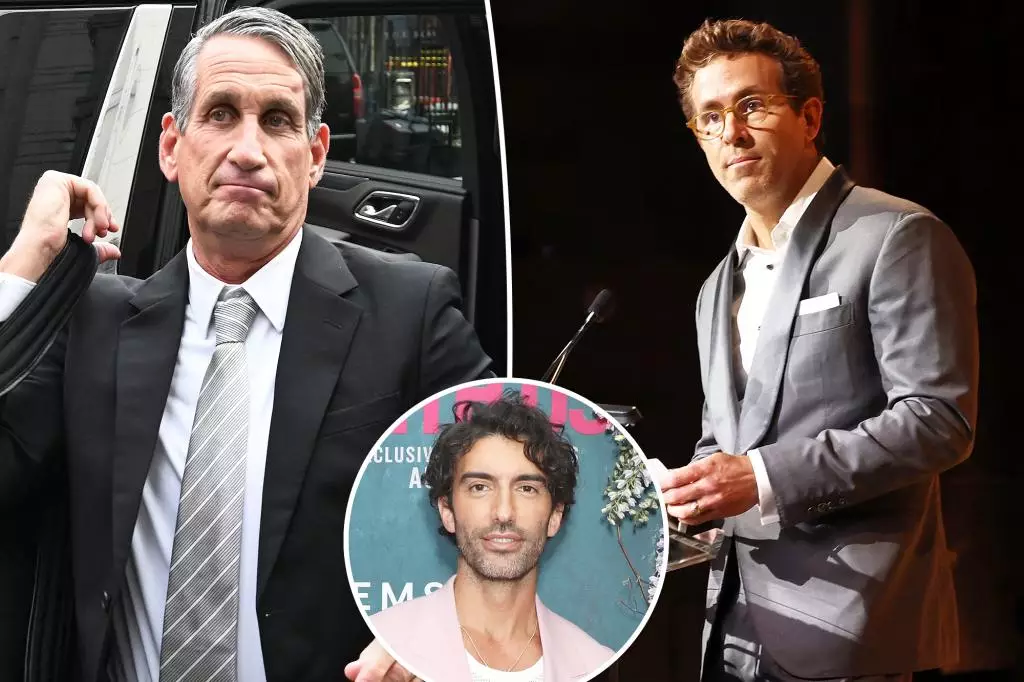The legal clash between actors Justin Baldoni and Ryan Reynolds has devolved into a media spectacle, stirring differing narratives from both parties. At the heart of the controversy is Baldoni’s $400 million lawsuit against Reynolds and his wife, Blake Lively, which claims defamation and extortion. Baldoni accuses Reynolds of branding him a “sexual predator” during a high-profile industry event, thus questioning the integrity of his personal and professional reputation. The ramifications of such claims delve far beyond mere accusations; they raise pressing questions about accountability and the power dynamics at play in Hollywood.
Baldoni’s allegations suggest that the stakes are high. A celebrity’s reputation can be built or destroyed on the whisper of a rumor, and in this case, Baldoni feels that Reynolds’ purported labeling has led to tangible professional consequences. By claiming he was dumped by a talent agency based on these allegations, he emphasizes that the power a celebrity wields is not merely about fame but also about the influence they hold over others’ careers.
The Legal Maneuvering: Reynolds Strikes Back
In response, Reynolds and his legal team are vigorously pushing back, framing their defense around the idea of First Amendment rights. Their assertion boldly claims that Reynolds was merely expressing an opinion—an argument that, if upheld in court, would shield such statements from defamation claims. They maintain that the statements made about Baldoni reflect genuine beliefs stemming from serious accusations laid out by Lively, reinforcing the notion that this conflict is not just a petty dispute but rooted in substantive issues of harassment.
This legal maneuver is perplexing. While the First Amendment protects free speech, this right is not absolute, especially when it crosses the line into potentially harmful territory. The attorneys representing Reynolds insist that Baldoni’s claims lack the requisite evidentiary weight to proceed, positioning their client as both the victim of a vindictive smear campaign and someone exercising his right to speak out against misbehavior. The implications here illustrate a battle not just for reputations but for the very framework of accountability in the entertainment industry.
The Role of Gender Dynamics
The context surrounding this dispute cannot be divorced from the broader conversation about gender dynamics in Hollywood. The attorney representing Baldoni, Bryan Freedman, has described Reynolds as attempting to “run from the flames,” a vivid metaphor for the emotional baggage and societal responsibilities tied to celebrity status. If Reynolds did, indeed, contribule to or engage in a campaign against Baldoni, it opens the floor for even more significant discussions about male privilege and the utilization of power to silence dissent or accountability.
Feminist discourse has long highlighted the dual standards often at play when allegations of misconduct arise. If Lively’s complaints are validated, it suggests a systemic issue where powerful men attempt to ostracize their critics, and such a reality cannot be ignored. The legal proceedings following this dispute will inevitably reflect a microcosm of the larger cultural reckonings around gender, power, and moral conduct.
Public Perception: The Media Circus
Both parties seem to recognize the media frenzy that surrounds this case. Baldoni’s legal team has presented their grievances in a manner resembling a public relations offensive against Reynolds, whom they suggest is masking predatory behavior behind a facade of comedy and charm. Conversely, Reynolds’ camp maintains a light-hearted approach to their situation, asserting that the claims against him are simply an amalgam of grievances built on jealousy and competition.
The ironic twist is that both have seemingly played into the public’s appetite for drama while simultaneously attempting to uphold their images. As their narratives unfold in real-time for millions, fans and observers are left to grapple with not only the facts as they appear but also the narratives constructed by media slants. The showdown encapsulates a classic Hollywood trope: the messy, convoluted drama that pits popular figures against each other, igniting public interest while obscuring the underlying complexities of the human experience behind it all.
The Countdown to Court
As the trial approaches, scheduled for March 2026, the stakes are likely only to rise. With several moving pieces—accusations of sexual harassment, defamation claims, and the possibility of character assassination—this legal confrontation reveals much about the current cultural climate in Hollywood. Issues of consent, accountability, and reputation hang delicately in the balance as both sides prepare to argue their cases publicly and legally.
It is a curious moment for both actors, facing scrutiny not only from each other but also from an audience eager for resolution and perhaps, deeper truths about how accountability is navigated in a platform-driven celebrity culture. As the narratives unfold, it will be interesting to watch how both Baldoni and Reynolds maneuver the tightrope walk of reputational survival amidst a cacophony of public opinion and legal scrutiny.

Leave a Reply